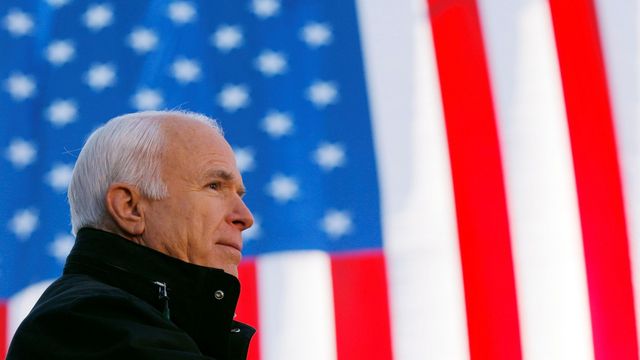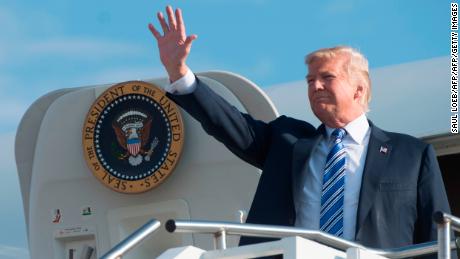
McCain’s America Buried Along with Him: US Now Belongs to Trump
George W. Bush, Barack Obama, Joe Biden, Michael Bloomberg, Henry Kissinger, a further array of senators, Republicans and Democrats, and members of former American administrations – again, from both main political parties. The list of personalities who will arrive at Washington National Cathedral on Saturday to say farewell to the late John McCain reads like a “Who’s Who in American Politics.”
At McCain’s request, next to each attendee’s name and that person’s current or former job description, one additional characteristic is listed: “Friend.” For example: “President Barack Obama: 44th president of the United States of America, Friend.”
A Happy Man
For those close to McCain it may be a comfort in sad times. McCain had a wonderful life, and the term “friend” is no fake title. Through all ideological differences and political battles, McCain remained capable of respecting his opponents, and they respected him in return. He was an exceptional politician and a happy man.
For America, however, McCain’s departure is all the more difficult and portentous. He was one of the last of his kind; compromise and respect for opponents aren’t fashionable in today’s U.S. In this world, one is a “lightweight, low-energy, sweaty liar,” just a small sample of the insults current President Donald Trump hurled at opponents during the 2016 election campaign.
Trump won’t be traveling to Washington on Saturday. According to the White House, he’ll be in Camp David, the president’s summer residence. Those around him will try to keep a lid on his temperament, to keep him from tweeting. Trump will breathe a sigh of relief once the crying for McCain is over. Not just because he can’t stand it when he’s not the center of attention, but also because McCain, as a person and politician, was his absolute polar opposite.
Rapists and Dreamers
One of the strongest themes Trump used to drive voters to the polls was his harsh stance against immigration. Against criminals who “come to the U.S. to rape women.” Trump promised a wall and across-the-board deportation.
McCain, in contrast, repeatedly strove for nonpartisan compromise on large-scale immigration reform during his career in the Senate. That’s what he tried, for example, in his cooperation with Democratic Senator Edward Kennedy, who, by sad coincidence, died exactly nine years earlier of the same type of cancer as McCain.
Most recently, in 2013, part of the immigration reform proposal in which McCain participated, yet again, was a solution to the situation of young people who came to the U.S. illegally, with their parents, when they were children. These “dreamers” have since completed their education and entered their professional lives, and the reform proposal opened their path to citizenship.
Trump, in contrast, blew up their lives into extreme uncertainty when he canceled the provision granting them legal protection for U.S. residency. McCain saw them, first and foremost, as fellow citizens and tried to resolve their predicament. Trump, regarding them as common dirt, washed his hands of them in a shirking of responsibility.
Thumbs-Down for a Divided America
A good example of McCain’s broader view of politics was his approach to Obamacare. McCain voted against it in 2010. But his last vote of any kind in the Senate, before he retired to his family circle in Arizona, was last July’s thumbs-down, when he thwarted Republican efforts to cancel the reform.
Many claimed it was revenge on Trump. Actually, McCain returned to himself with that vote. To his instinct and conviction that politics is not a game of the victorious and the defeated, that it’s not possible to continue in the practice, in which one party passes such a basic law influencing the lives of tens of millions of Americans without a single opposition vote – only to have the other party cancel it in a single blow, and once again solely of its own volition.
As McCain appealed to his Senate colleagues last year, “I hope we can again rely on humility, on our need to cooperate, on our dependence on each other to learn how to trust each other again and by so doing better serve the people who elected us. … Let’s trust each other. Let’s return to regular order. We’ve been spinning our wheels on too many important issues because we keep trying to find a way to win without help from across the aisle.”
He already knew about his fatal diagnosis; it was an impassioned farewell speech. But he was fully himself. He was that America that he wished for himself as a place to live in.
This Land Is Trump’s Land
Once McCain is buried at the United States Naval Academy in Annapolis, Trump will re-raise the American flag now flying at half-mast over the White House, as a sign that America is once again his, and his alone.
Trump needs only to spend one weekend in the shadows; present-day America, to wit, is much more the land of Trump than that of McCain. Trump was elected in a direct revolt against what McCain stood for in American politics.
And that was McCain’s conviction that, with concrete as well as general political issues, the other party is not a “tribal” enemy to be stomped into the ground, but someone with whom he could reach agreement for the sake of the common good. This America will be symbolically lowered into the grave this weekend.
“The moral values and integrity of our nation, and the long, difficult, fraught history of our efforts to uphold them at home and abroad, are the test of every American generation,” was the message McCain left his countrymen before his death. It’s up to them alone, whether to take up his words once more as their own, or to place more trust in Trump and the idea that only with him, and in his style, can they make their country great again.


